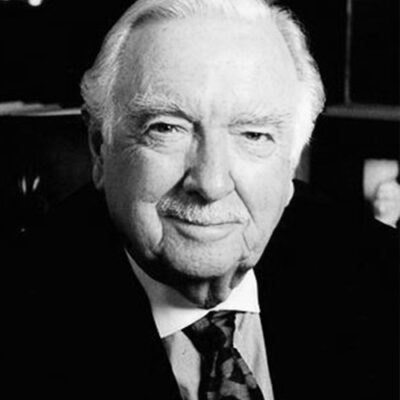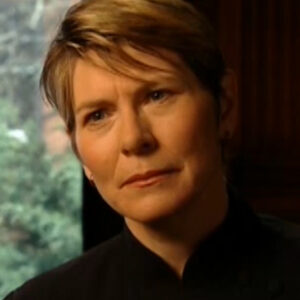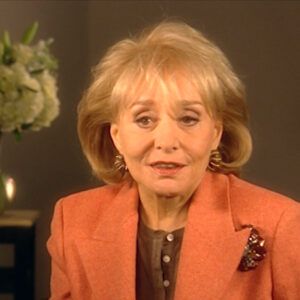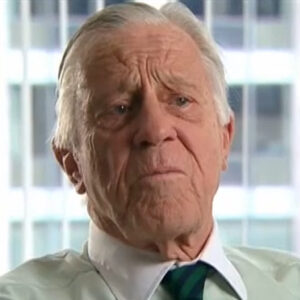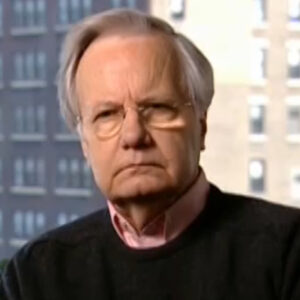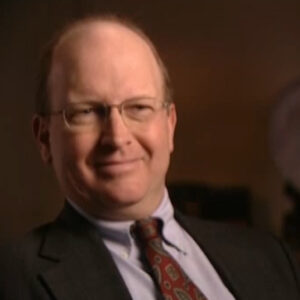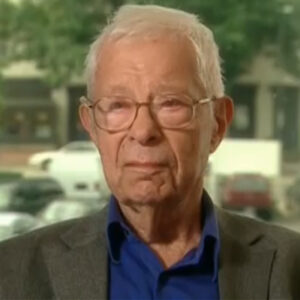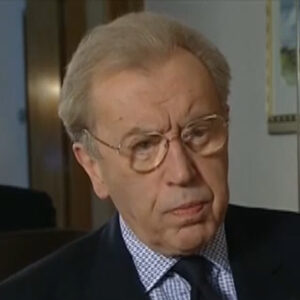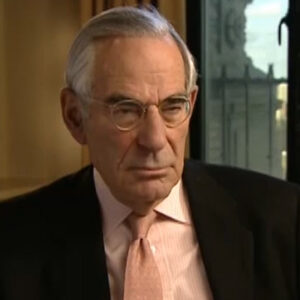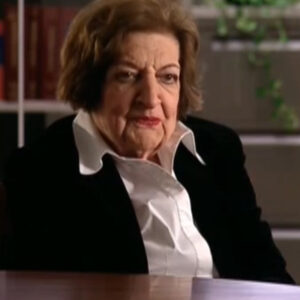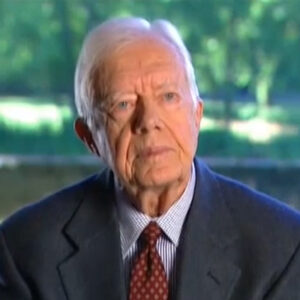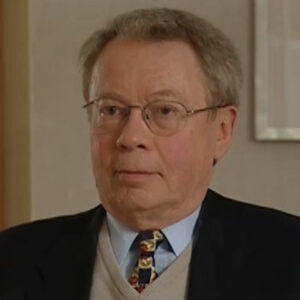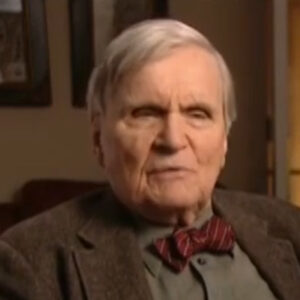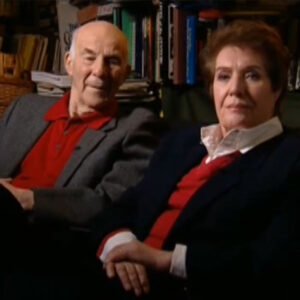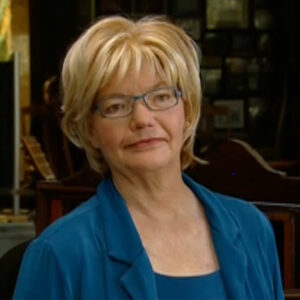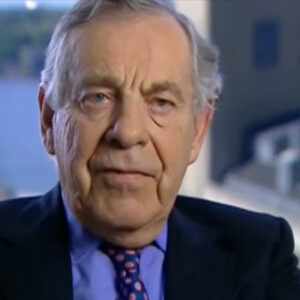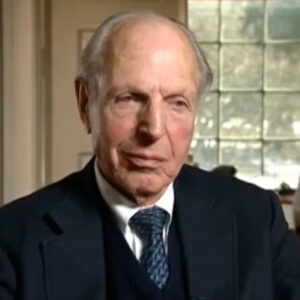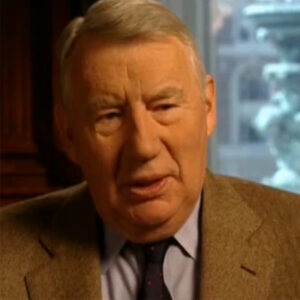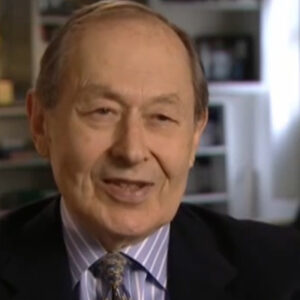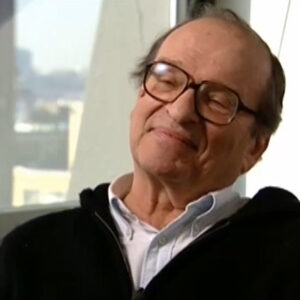Speaker Well, what I remember is that shortly before we were released, we looked out the windows of the.
Speaker Sorry, could I. I’m kidding. Okay. Okay.
Speaker One of my recollections of Walter Cronkite was when we were about to be released from prison in Hanoi as a result of the agreement made at the Paris peace talks. And someone looked out the window of our cell and some guy said, my God, it’s Walter Cronkite. So we were we were pretty sure we were going home when we saw Walter at that particular moment in time.
Speaker Now, was that the first time you had met Walter Cronkite?
Speaker Yeah, and I actually didn’t meet him then. It wasn’t until later on when he and I got together to go to Hanoi, back to Hanoi on the 10th anniversary of the fall of Saigon. And that was in 1985.
Speaker There’s a very interesting little anecdote. When you two were inspecting the monuments on your return visit, hundreds of Vietnamese gathered nearby and were chanting McCain.
Speaker I wonder if you could tell that first thought, if I could say that to win. Walter approached me. Actually, his producer approached me and said that they’d like to go back to Hanoi. I was intrigued by it because I wanted to see what had happened in Hanoi. I’d never seen anything of Hanoi except from the hear her and the limited view from a prison cell. So I was glad to go. We went in. There was really kind of an isolated experience. We stayed in a in a what they called a hotel that we’d been built by the Cubans that had one thing on the menu every day. So although they had a long menu, they only had one thing that was served. Conditions were terrible in Vietnam. I mean, they were really awful. Everything was dank and dark. And they were still going through this reeducation camp stuff and they didn’t understand what they had to do. So it was an interesting experience and we were kind of isolated together. The four of us, we didn’t see a lot of people. We weren’t welcome there particularly. But anyway, we went to the next to the lake in Hanoi that I went into when I was shot down. There’s a little monument there made out of very poor quality concrete and has my name on it. It’s insulting because it says I was in the Air Force and I was actually in the Navy. But so we went and we were there and all of a sudden this huge crowd of Vietnamese gather around and they start yelling, McCain man came McCain. You know, I don’t get that kind of reception in Phoenix. So it was quite an interesting experience. But could I could I just add spending that 10 to 12 days with Walter was one of the great experiences of my life because I was around a man who was a giant in America. We all know voted the most respected Manam man in America for many years. But he has a wealth of memories and experiences that I found fascinating. When I asked him about visiting Lyndon Johnson at his ranch. He literally had been a part of every major aspect of American history for some 20 years. And finally, I found him to be one of the most kindly, courteous people I’ve ever known in my life.
Speaker That’s great. Now, I just wondered if you could have a punch line to that story when the people were chanting McCain, McCain.
Speaker And you said you’ve turned apparently and told Wilsher that it’s the only place we could go on the World War, I’d be more recognized.
Speaker That’s exactly right. When that crowd gathered round and started yelling my name, I looked at Walter and I said, Walter, this the only place on earth we could go where PPIF my where I am more recognized than you are. And I think he found that to be entertaining. And because it’s true, it was true.
Speaker Now you think we’re on the same generation in a way. We grew up watching Walter, and I wondered if you can tell me if you have memories of some of the reports, some of the reports that he made that were the most moving and most memorable to you.
Speaker Probably the most memorable that I saw was when Jack Kennedy was shot. His coverage of the assassination of Jack Kennedy was it was long, he was detailed and it was at times understandably emotional. But one of the moments that will stand out in history was the not anecdotal story after the Tet Offensive, when Walter Cronkite had gone to Vietnam and said over national television that he didn’t believe there was a role for U.S. troops in Vietnam anymore. Lyndon Johnson was watching and reportedly said after watching Walter say that, well, at the end of the war, snapped off a television set. That’s a testimonial to the incredible influence that Walter Cronkite had with the American people. And Lyndon Johnson, the consummate politician, recognized that.
Speaker Now, what were your feelings when you heard that story?
Speaker I did. I didn’t hear it. No, I didn’t hear for for many years later, because I was at that time a guest of the North Vietnamese in Hanoi where, you know, Walter Cronkite. When you heard that, that’s what he said. Were you surprised? Was that something surprising? It was so many years later that I heard about it that it’s I. I put Walter’s comment in as a pivotal point in the history of the Vietnam War, that one man had incredible influence over American public opinion.
Speaker Now, CBS News got into a lot of hot water over Vietnam coverage, but Cronkite didn’t care. He said we must never, never, never consider the consequences that our information will have on people or on ourselves. Oh, we must do is to be sure that we are right and the facts are correct, correctly presented.
Speaker Do you agree with that statement? Well, I certainly agree that the news media have to present an objective view of the facts to the American people. I think that in the case of the Vietnam War, it was the events on the ground that dictated American public opinion rather than any news organizations interpretation of the facts on the ground. I regret that we lost the Vietnam War. I deeply regret it. But after studying it in depth, I think there was a lot bigger problems associated with the conduct of the war than any news organizations interpretation of the events.
Speaker Can you tell us as a senator and as a television watcher and as a friend. What are Walter Cronkite’s qualities as a person?
Speaker First of all, his personal qualities are he’s one of the most courteous, kindly, sensitive individuals that I’ve ever spent a lot of time with. Second of all, I think probably more importantly, he has a vast, vast experience of literally observing and reporting on and therefore being part of major events of the last two thirds or half of the of the of the 20th century. So he brings a unique perspective of that kind of involvement and observation that, frankly, I don’t know where else she would find such knowledge and experience.
Speaker How did television do you feel? Television changed the events that I covered, especially the conventions and then the entire nominating and campaign process that now must have impact on you. I mean, I know in the 50s it was very open and you saw that democratic process right on the floor.
Speaker And then, of course, in the 60s started things started changing with.
Speaker Well, television hasn’t changed the process so much because our primaries are now such that the winner is selected so early and therefore the conventions, rather than be a being a battleground or a coronation where television has really changed the conventions, is that they the networks have finally said, look, we’re not going to cover every single day for a week. And so we have shorten and shorten our conventions. And we have understood that we have to maximize the few hours of primetime viewing that that the networks will will broadcast to the American people. But it’s an important time because most Americans tune in to those few hours and form their impressions of the candidates, probably in a significant way for the first time.
Speaker For a long time, television was the least respected medium of news for newspapers and radio. And that changed. When did you start watching television?
Speaker Yes. I, like most Americans in the 50s, began to watch television to get the evening news. But I think it’s important also to comment that, in my opinion, it’s almost impossible for a press person to reach the transcended position that Walter Cronkite did. We now have 150 channels rather than three. We now have the Internet. We now have instant breaking news on a constant basis in Walter Cronkite’s heyday. Americans waited for the evening news and it was by appointment. And so as talented and as wonderful as news commentators may be today, they’ll never be able to grab center stage the way that Walter Cronkite did.
Speaker On his wall, Walter has friends. Viewers rarely recall and relish a Cronkite statement. They believe it. Instead.
Speaker I think that pretty well says it all, that they can’t probably remember what he said, but they trust what he said and that was why he’s had such a tremendous impact for such a long time on American public opinion. When you think about it, it’s remarkable this one individual would be viewed the most trusted person in America for a long period of American history.
Speaker When asked if there is the natural adversarial world between the press and government, Walter answered, I hope so.
Speaker As a politician, do you approve of that statement or what do you think of that statement? I think Walter’s comment that there should be an adversarial relationship is largely true. I don’t know if adversarial is exactly the word I would use, but there certainly has to be a relationship that gets all the facts and information out to the American people about how government is working. And you have to have a certain distance and objectivity between the media and the government in order to achieve that balance. Walter said that he regretted retiring almost immediately.
Speaker And ever since then. Ever since. With every big story, I wished I were covering it. Still do.
Speaker Does that surprise you? It doesn’t surprise me that he regrets having retired. You know that the horse that drew the milk wagon, you showed up every morning in front of the place ready to go to work. And I can’t make a judgment as to when Walter should have or should not have left. But I do think it’s important to remember he left while he was still on top.
Speaker After Cronkite stopped doing the nightly broadcast, he quickly became very outspoken, outspoken about world affairs, domestic affairs, his business.
Speaker What do you think of what you think? I do think Walter felt qualified to make judgments on events of the day. He certainly had been exposed to enough. And I think he felt an obligation to have a certain freedom to express his views on issues. I may not have agreed with all those views, but I certainly listened to. That’s it. That’s wonderful. Can I just say. Can I just say in summary, one of the great experiences of my life was way back in 1985 when I received a phone call from a producer. And saying that Walter wanted to go would honor me by asking me to accompany him back to Hanoi. We spent about 12 days together in very close quarters with very little outside influences. And to get to know one of the great men of our time was a great and wonderful experience for me and one I’ll never forget. And your friendship has continued? Yes, it has. And one thing about being around Walter Cronkite is you’ll hear some stories that are just remarkable about the great figures of our time, because he was actually in many ways a participant in those events, as well as an observer.

